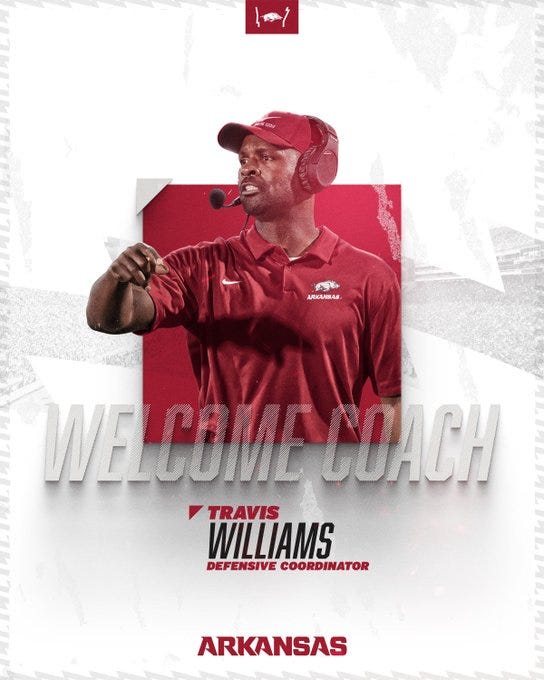Representation Matters
Discussing new Razorback defensive coordinator Travis Williams
Since its inception in 1894, the Arkansas Razorbacks football program has had two black men serve as coordinators. Garrick McGee served as the offensive coordinator under head coach Bobby Petrino for the 2010 and 2011 seasons. Paul Haynes had a one-year tenure as the defensive coordinator under interim head coach John L. Smith in 2012.
That’s the whole list.
In approximately 128 seasons of Arkansas Football, the Hogs have had a black coordinator for three years. That’s two percent of seasons for my math folks. Also, for my math folks: nearly two-thirds of SEC football players are black.
And, yet, after Derek Mason’s firing from Vanderbilt, there is not a single black head coach in the entire Southeastern Conference. The SEC is the only one of the power five conferences with zero black head coaches.
At the coordinator ranks, things are slightly improved. If I’m being generous by counting co-coordinators, there are currently six black coordinators in the SEC: Tim Banks (DC, Tennessee), Maurice Crum (Co-DC, Ole Miss), Marcus Johnson (run game coordinator, Missouri), DJ Smith (Co-DC, Missouri), Clayton White (DC, South Carolina), and now Williams here with the Razorbacks.
Six coordinators out of a minimum of 28 available positions is still an underwhelming percentage, and not reflective of the racial makeup of the players on the field throughout the conference.
Representation matters.
And, no, race is not the only identity in which a college football player could find himself reflected and validated in his coach. It is, however, one that is deeply intertwined with the roots of our country and one that is vastly underrepresented in the college football coaching ranks.
In an era where teams are allowed to feature patches on their jerseys with pithy social justice phrases like “Equality,” “Togetherness,” and “Awareness,” Sam Pittman has taken an actual step to right a wrong that exists in the college football landscape. Selfishly for Pittman, it’s also a move that should impact winning, but more on that later.
I want to stay with identity for just a bit longer. Identity is intersectional, and each of us place different values on different parts of our identity. Maybe you identify more with your class than your race. Maybe you identify most with your gender, your religion, or your profession. Regardless, good CEOs fill their company with all these different identities. And make no mistake, head coaches must be good CEOs.
Williams is a homerun hire because he brings multiple identities to the table. His age is another chance to connect with his players. The average incoming freshman for next season was born in 2005. You may not know this, but most 18-year-olds don’t have a ton in common with dudes who are closer to collecting Social Security than they are to their playing days. When you compare Williams to some of the 50-60 year-old white men who were also rumored for the job, he seems like a no-brainer.
On top of that, Williams can identify as a former SEC football player. That is going to be huge in connecting with the hotly recruited talent Arkansas will need to acquire to win in the SEC. When you factor in all of those identities (race, age, former SEC football player), Williams is a home run hire.
I did say we would discuss how Williams will impact the Razorbacks on the football field. And I don’t mean to be crass, but Pittman didn’t just make this hire because it helped to correct a generations old social injustice. Hiring Williams is a drop in the bucket across the college football landscape. No, Pittman did it because he thinks Williams will help Arkansas football win more games.
And he’s probably not wrong. Having a young, black, former power five football player can absolutely impact recruiting. Earlier I mentioned White, South Carolina’s defensive coordinator. He is black, just slightly older than Williams at 45, and played linebacker at a Power 5 school.
White also just helped secure a recruiting class where the average star ranking of defensive recruits was 3.7. South Carolina had the 16th overall recruiting class by composite rank according to 247 Sports. Compare that to the Arkansas recruiting class spearheaded by former defensive coordinator Barry Odom where the average star ranking of defensive commits was a 3.1 as part of the 21st ranked recruiting class.
Representation matters.
But so do results. Especially in the SEC. Especially with this fan base—a fan base that just saw more wins over a two-year span than they’ve had in over a decade, and there are still folks calling for Pittman’s dome served up on a platter.
If a discussion of race and identity felt too political a topic for you (it shouldn’t be, but I recognize I took a risk discussing this in the very first edition of this newsletter), don’t worry. If you’ve made it this far, I have a nugget just for you:
Williams’s hire should also improve the on-field product. It would be hard not to.
Arkansas finished the season ranked 124th in the country in total defense. Dead last in the SEC. Scoring defense? They were 101st, which only beat Vanderbilt in conference. Red zone defense? 93rd in the country and 11th in the SEC.
Williams’s UCF squad ranked 69th (5th in conference) in total defense, 46th (3rd in conference) in scoring defense, and 5th (1st in conference) in red zone defense. With the way Kendal Briles’s offense scored points this season, imagine what Arkansas’s record would have been with those kind of defensive numbers.
To complete the rule of three: Representation matters.
So does winning. Williams should impact both for the Razorbacks.



Go Hogs!